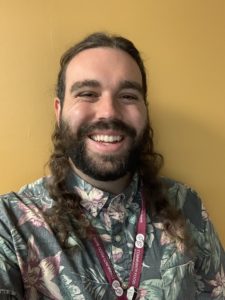Q&A with Alexander
Alexander Swain is the Volunteer Services Coordinator at the Community Food Bank of Southern Arizona. Originally from a town near Ann Arbor, Michigan, Alexander studied Biology at Hope College in Holland, MI. After graduating, he attended the University of PIttsburgh to get a Masters degree in Neuroscience.
Alexander has also recently been elected to the SAVMA Board of Directors for 2021.

Alexander Swain
Volunteer Services Coordinator at the Community Food Bank of Southern Arizona
How did you get started in this field?
After my foray in the sciences, I decided to do a service year with the Episcopal Service Corps to discern some new directions in life. I knew that the isolated world of academia was not where I was being called. So, I joined the Beloved in the Desert Episcopal Service Corps year here in Tucson, AZ.
My placement site was the Community Food Bank of Southern Arizona, and I worked with the Community Engagement department and worked with volunteers quite a bit. It was a fantastic match, and after my year of service I was hired as the Volunteer Services Coordinator!.
What is something that you learned that has been really helpful in your career?
Communication! Communicating with volunteers about what is going on in our organization, why we’re making the decisions we are making, expressing gratitude to them, and letting them know the impact of their labor have been really helpful in retaining volunteers and developing deeper relationships with them! I wish I would have known, when I started this career, how variable and flexible one has to be with everything that is going on within the organization, particularly during a pandemic. But, over time, and with great co-workers, I have adapted. :)
What is your strength and what is one key advice that you would give to a volunteer manager?
A strength of mine, I think, is an ability to distill data of volunteer impact and communicate it. This has been met with great reception by our volunteers, and they’ve really enjoyed getting to see the fruit of their labor from email communications detailing, for example, how many households were helped by their labor and how many pounds of food were distributed on a given day! One bit of advice, I would say, is that this is a very collaborative position – not only within the organization, but with volunteers as well. You are all in it together, and figuring out how to navigate the skillsets of peers and volunteers for the best outcome for the organization and volunteer experience are very important.
Who have been your mentors in this field?
Mentors in the field have been my bosses, Anel Ainza and Stacy Oliver, as well as our Chief Development Officer, Sio Castillo. I think, too, mentors from my academic years would include professors that I TA’d for, where I learned how to work with students and folks coming from various backgrounds, meet them where they are at, and work from there.
How do you define a volunteer manager?
A volunteer manager, I think, must be a jack-of-all-trades. One who is adept at organization, quick to communicate, collaborative, and an individual who has many fingers in many pies (so to speak). So, I might define a volunteer manager as: An individual who recruits, assists, retains, and communicates with, and develops relationships with volunteers in order to pursue the mission of the organization that one is working for.
What are some “other duties as assigned” that came with your position?
Oh boy-howdy. It’s a very on-your-toes kind of job. Duties include making sure hours are being logged and tracked appropriately, information on the website is up-to-date, email and phone inquiries are being answered, that other departments have the support that they need – and that the volunteers within those departments are being supported. Also, making sure that interns and service corps members are supported! Lastly, I think, it’s making sure that we have access to accurate data to report for grants and for internal and external communications, particularly edifying the immeasurable and amazing help that we as an organization receive from volunteers. It’s all a bit blurry now, thanks in part to the pandemic, but it’s incredibly rewarding.
Describe a memorable moment with volunteers.
A few weeks ago, it snowed here in Tucson. On that day, we had about 40 volunteers with us outdoors assisting with our food distribution efforts. It was a cold morning, but when the snow came down it became magical – for about 5 minutes. And then we were all wet, cold, and we were still handing out food. Afterwards, we were all laughing joyfully about it – how wild it was that it snowed in Tucson while being outside in a pandemic, distributing food to those in need in the community – a once-in-a-life-time experience to say the least.
How do you recharge or practice self-care after a long day of work?
Having clear boundaries about work and personal time, I think, is key. If I am not on the clock, I will not check email or answer messages regarding work – unless it’s an extreme emergency. At the end of the day, one must understand that you have done the work you needed to do for the day, and that it is sufficient, even if it qualitatively feels like it’s not! The emails can always be answered the next day, the work will continue – but you will not. So, having those clear work-life boundaries is key to practicing self-care and preventing burn-out, in my experience.
